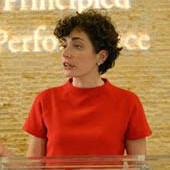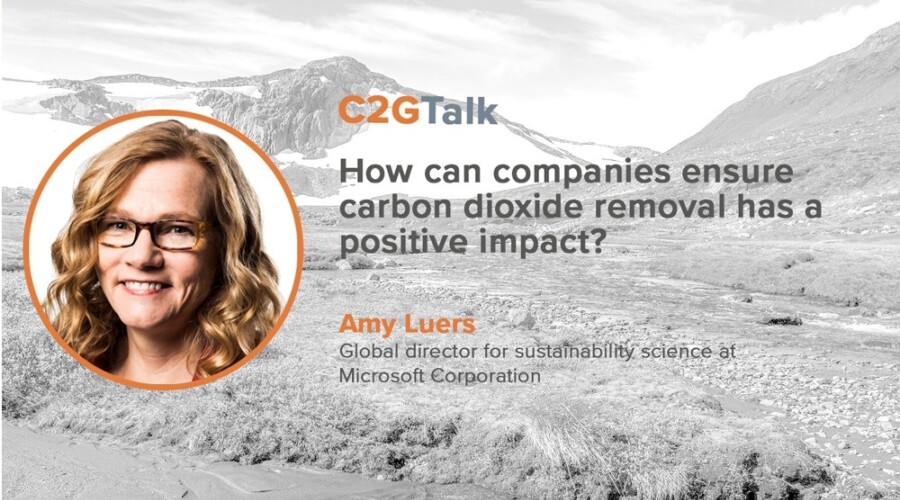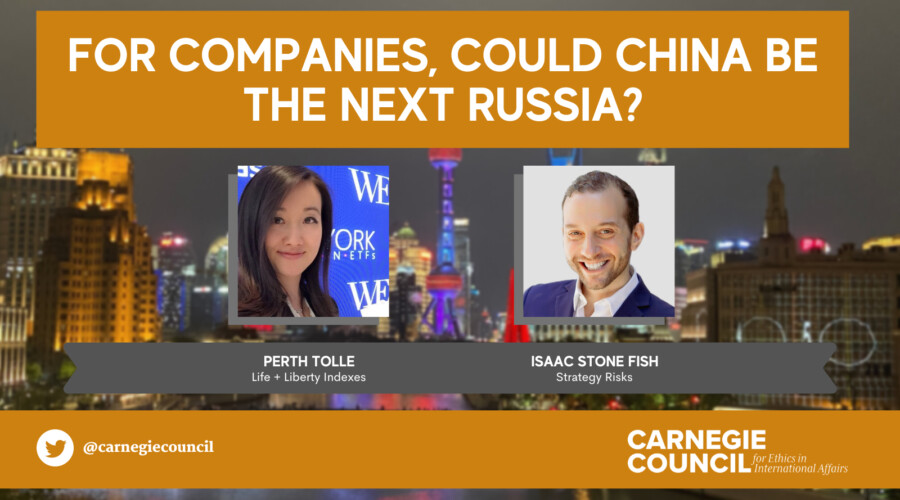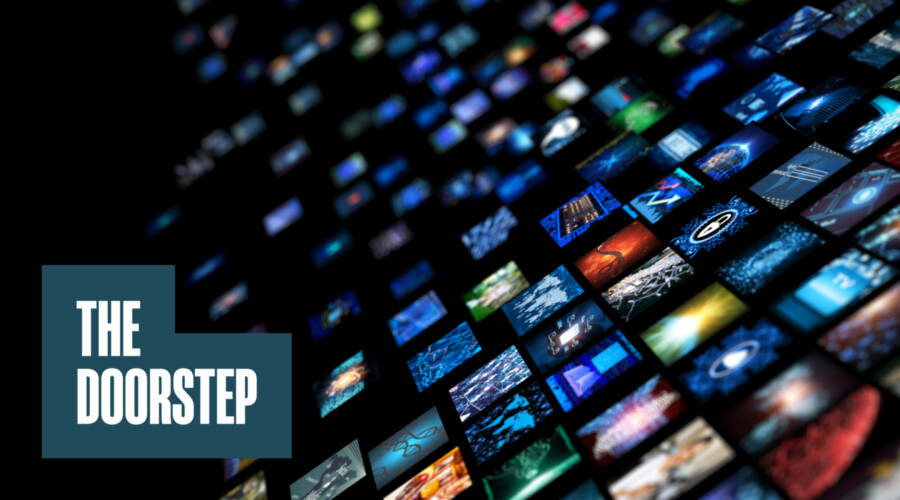Michael Ellis, from the sustainability consulting firm GreenOrder, discusses how companies can work with employees to make sure they're onboard with green initiatives--and why that's such an important part of green workplaces.
JULIA KENNEDY: Welcome to Just Business, a series of interviews on global business ethics. Today I'm talking about green workplaces with Michael Ellis, associate principal at the sustainability consulting firm, GreenOrder.
Educated at Harvard and Yale, Ellis has worked with General Electric and others to create truly sustainable practices that are linked to cost savings and green marketing.
Ellis has a wide range of expertise, but today we'll focus mostly
on how companies can work with employees to make sure they are on board with
green initiatives and why that's such an important part of green workplaces.
Michael Ellis, welcome to Just Business.
MICHAEL ELLIS: Thank you very much for having me.
JULIA KENNEDY: Let's start with the topic of the day. Tell me why it's so
important for companies to include employees in their sustainable initiatives.
MICHAEL ELLIS: For so many reasons. First of all, of course, it can help
companies cut costs. Second of all, it can help companies identify new revenue
opportunities. I'll be talking much more about that later.
But perhaps most
importantly for the subject of this program and the interests of your audience,
it is essential for employee engagement. It is increasingly something that employees
expect from their companies and that employees are looking for. A recent survey
actually showed that in 2010, 86 percent of American employees were not engaged
by their companies on environmental sustainability. Many of them expect to be.
So I think it's increasingly a differentiator in hiring and attracting and retaining
employees as well.
JULIA KENNEDY: In your work with different companies, what have you found
are best practices for actually engaging employees, beyond doing something like
buying a green building or cleaning up your supply chain?
MICHAEL ELLIS: The most important thing is to be very clear about the goals
of one's program to increase greenness at work. We find that the companies that
do it the best are those who really tie it to their business strategies. You
can have employees print double-sided. You can have employees shut off the lights
or wash their own mugs rather than throwing out disposable cups or bottles.
All those are good things to do. But it's even better if you can have employees
identify ways to cut costs by lowering energy use in a factory, for example,
or if you can have your engineering teams focus on designing products to sell
in the marketplace that reduce energy use for their customers. We find that
the latter, where you really connect what employees are doing for your core
business, is much more powerful than just doing the former sort of green-at-work
practices.
JULIA KENNEDY: On the flip side, what are some things that you have seen
companies try to get employees on board that really aren't that effective?
MICHAEL ELLIS: One example is only focusing on green-at-work practices in
the office and not making them easy to do—encouraging employees to, to
use a very common example, print double-sided, but not making that the default
on all of their computers or starting initiatives to encourage bicycling or
commuting to work, but not providing the tools to do that, not providing a financial
incentive to buy a bike or maintain a bike. So many employees—as I mentioned
earlier, 86 percent of employees in 2010—are never engaged by their companies.
That's certainly the worst practice. The closer a company can connect it to
what they are actually doing, to their customers, to why the employee is at
the company in the first place, the better.
JULIA KENNEDY: It's great to have you here. I have done a lot of these interviews
where people say, "Our company is going green," or, "We encourage
companies to go green, because employees are asking for it, because they want
it. We get the best candidates when we have these initiatives."
But then,
at the same time, there have been studies that show that behavior change has
to be, as you mentioned, incentivized. How does that dynamic play out, where
there is a bit of getting employees to take their medicine, even though they
have been asking for these kinds of sustainable initiatives?
MICHAEL ELLIS: Green-at-work initiatives, sustainability initiatives really
need to be thought of strategically and as a whole. You can't just think, "Employees
are asking for this type of program, so I'm just going to implement it and let
it run by itself." You have to manage it like you would any business strategy.
That means setting clear goals before you even start, putting structures and
processes in place to monitor and manage the program over time, and then to,
among other things, continuously improve the program as you get feedback. Many
companies don't think of all of those parts throughout.
One very simple framework that we use to think about sustainability-at-work
initiatives goes by the acronym TEAM. It stands simply for "transparency,
engagement, accountability, and motivation."
- In transparency, it's important to share data and ideas with employees,
to show them, "This is what our water use looked like over the last few
years, and here are our goals for the next few years. We will update you quarterly
on progress."
- On engagement, to involve team members at all levels of the company, so
not just new hires who might be interested in it, not just employees in the
office, but also employees in your distribution centers or your factories.
- On accountability, to create specific goals and to assign specific responsibility
to people so that there are cheerleaders throughout the organization, so that
there are leaders who are accountable for certain results, so that senior
leaders have this as one of their priorities—in other words, so that
they have an incentive to participate and encourage their groups to participate
as well.
- Finally, on motivation, to give awards, whether they are formal or informal, monetary or nonmonetary, to compare to competitors and say, "We're slightly behind competitor X. If we do this, we can get ahead." The TEAM framework can help there. But, ultimately, I would say, it comes back to this point of linking it closely to your business strategy. There is nothing more motivating, I think, to employees than if the sustainability-at-work initiatives that they are involved in are connected to the product that they are designing, to their conversations that they are having with their customers, to what they talk about in industry associations that they are a part of, and so forth.
JULIA KENNEDY: Give me an example of a company that has done that really well, that has been able to link their initiatives very closely with their core mission as a company.
MICHAEL ELLIS: One of the main client-partners that I work with, as you mentioned earlier, is General Electric. GreenOrder has been the primary strategic advisor to General Electric on the design and launch of Ecomagination and on its ongoing strategy and evolution over the last five and a half years.
JULIA KENNEDY: Ecomagination is GE's green brand. You can talk more about that later. Anyway, continue.
MICHAEL ELLIS: I would highlight just a couple of examples of how GE does it well. Ecomagination is a core business strategy for G.E. It's one of their main strategic initiatives to grow revenue over the coming years and decades ahead. It involves five commitments, in particular, which link employee engagement to this overall strategy. Those commitments include goals around revenue growth, R&D committed to developing cleaner technologies, reducing the energy intensity of their own operations and water intensity of their own operations, and, fifth, engaging and working with the public.
On that goal of internal greenhouse gas, energy intensity, and water reduction, that's where employees play a very big role. One of the tactics that they have used is what they call Treasure Hunts. It's a process that they have developed with Toyota and others. It involves bringing together groups of dozens of employees at a particular office site or manufacturing facility and identifying, usually, millions of dollars worth of savings opportunities relating to energy use and water use at that facility. It's a multiday event that covers the factory, if it's a factory, during periods of operation and also standby. They identify savings opportunities and come up with a plan to attack each one of them.
Through those activities and similar activities, the company has saved well over $130 million in the last few years. Again, those are initiatives where employees have been very engaged, and it connects to their broader strategy to develop and commercialize cleaner technology. So it's part of the whole, making it all the more motivating to employees.
JULIA KENNEDY: Tell me more about Ecomagination and about your role and GreenOrder's role in the creation of this initiative.
MICHAEL ELLIS: Ecomagination is a business strategy for General Electric to develop and commercialize cleaner technologies and solve some of the world's and some of their customers' toughest environmental challenges. It covers all aspects of GE's business, from more efficient jet engines to more efficient water-purification technologies, all the way down to consumer products like light bulbs, compact fluorescents, LEDs, even energy-efficient dishwashers and refrigerators.
It has these five components of investing in R&D, growing revenue at twice the rate of GE's overall revenue growth, improving their own energy intensity and water intensity, and, finally, working very actively with outside stakeholders, including consumers and industry trade groups and commercial partners and so forth.
Ecomagination also has a portfolio of over 90 products, as I mentioned, from jet engines to light bulbs. We play a role in many aspects of the program.
One aspect of our work is serving as the third-party verifier of all of the marketing claims associated with the 90-plus products in the Ecomagination portfolio. As you may know, the FTC—-
JULIA KENNEDY: Federal Trade Commission, yes.
MICHAEL ELLIS: Right - has released "Green Guides" governing how the marketing of environmentally better products can happen. Greenwashing, of course, is the practice of inflating green claims or otherwise misleading the public through green marketing—by saying that something is environmentally friendly without qualifying it, for example. We work very closely with the GE team to ensure that all of the claims made about Ecomagination products are compelling and also defensible against any outside challenges or questions.
We also advise on the overall strategy of the initiative and where they can pursue new market opportunities—for example, in electric vehicles. They announced a major commitment last fall to purchase 25,000 electric vehicles over the coming years, which was the biggest commitment ever in that space.
Finally, we work with them on issues of their market strategy relating to eco overall.
JULIA KENNEDY: They have received accolades for a lot of their initiatives. One that I saw the most headlines about was that they are building the biggest manufacturing facility for solar panels in the United States.
I'm curious, from a marketing standpoint—the other big news about GE in the last couple of months has been about their taxes and about how they are paying very low taxes domestically, despite $5 billion in profits or something in the United States. I'm curious what your take is on that. They have gotten a lot of bad press as a result.
MICHAEL ELLIS: Obviously, I cannot speak and am not speaking on behalf of the company.
Look, I think that it is consistent with their obligation to shareholders to attempt to work within the law, obviously, to manage their tax burden and ultimately to minimize it. Honestly, I think that it is what any responsible profit-making enterprise would do. I think that, beyond GE in particular, it would be great if the publicity about this event could spark a broader dialogue about tax policy, not just on corporate America, but also on individuals. I think that would be a positive outcome, if we could focus more broadly on the systems problem surrounding tax in this country and how to improve the equity of the tax situation, and not to focus on individual companies per se.
JULIA KENNEDY: The reason I wanted to talk to you about it is, here's a company that has been lauded for its green initiatives, and then a Huffington Post article comes out saying they are not a good corporate citizen, after all this work that, as you point out, is not, quote/unquote, greenwashed; it's real, substantive work that GE has been doing. I wonder if you think that this kind of backlash could have an effect on other companies doing green initiatives if they are getting tax breaks, for example, for those green initiatives, which are policies that the U.S. government has put in place.
MICHAEL ELLIS: Right. It's a great point. I think that the real risk is for companies that do not view their "cleantech" or environmental innovation initiatives as holistic business strategies. I'll give an example, without revealing the company's identity, of a company that is a technology manufacturer, where their environmental initiative was really focused on just the marketing of certain products and the environmental attributes of those products. That company didn't think as clearly about how their sustainability initiative could impact manufacturing, how it could impact employee engagement, and so on. They were really primarily focused on just marketing.
Actually, they came under some scrutiny from environmental NGOs on some of their other manufacturing practices, in particular the environmental aspects of their manufacturing practices. It was the discord between the environmental practices in manufacturing and the environmental practices in marketing that really reduced the credibility of their overall initiative.
In this case with General Electric, I think, because Ecomagination is such a core part of their business strategy, it's viewed as a more honest and more complete strategy by the public and by outsiders. So it's a little safer from criticism than strategies that are a bit more piecemeal.
JULIA KENNEDY: Tell me about GreenOrder and its origins.
MICHAEL ELLIS: Sure. GreenOrder is an advisory service group within LRN. LRN's mission is to inspire principled performance globally, which we do through both online training and advisory services relating to ethics, governance, social responsibility, and environmental sustainability. With the GreenOrder advisory services, in particular, we focus on environmental sustainability as a way for companies to drive long-term competitive advantage and ultimately grow.
We help companies do three things, mainly:
- First, develop better products and services.
- Second, influence their customers, consumers, and other important stakeholders.
- Third, improve their environmental performance internally.
JULIA KENNEDY: But this is a new relationship between GreenOrder and LRN.
How did that come to be?
MICHAEL ELLIS: GreenOrder actually started over a decade ago, focused on
environmental sustainability. In 2008, we became part of the LRN. There is a
lot of good reason behind that. LRN wanted to further build up their knowledge
and ability to advise their client-partners on environmental sustainability.
And we thought it would be a great opportunity to develop joint solutions with
them and approach the market together, providing a full range of services, from
codes of conduct, writing corporate values and mission statements all the way
through to executive workshops and more customized, what we call high-touch
advisory services, helping companies formulate and execute their long-term environmental
sustainability strategies.
So it seemed like a marriage between two organizations
that could provide a lot of value to customers, to our partners, across their
needs relating to ethics, governance, social and environmental responsibility.
JULIA KENNEDY: Sure. When you are working with companies—you work a lot
with GE; I don't know if you have worked with a lot of other companies as well,
but I assume you have—what are the challenges that you find when you are
working with the C-suite or the upper-level managers, or does it come from the
middle-level managers, in implementing sustainability initiatives? Do you come
to them and ever get pushback for your ideas? How does that negotiation process
work?
MICHAEL ELLIS: The most effective initiatives that we are involved in are
those that arise from a mandate from the senior leadership as part of a commitment
to the public or a commitment to the board or to shareholders and so on. One
of the challenges that we face is in working with companies where that mandate
from the CEO might not exist. Maybe it arises initially as an idea within the
environmental health and safety or the chief sustainability officers' domain.
Part of what we help our client-partners with is developing the business case
and long-term strategy for sustainability initiatives to gain the support of
that senior leader's peers and, of course, ultimately the CEO, as one example.
One of the other challenges that we find in big environmental sustainability
initiatives is in rolling out the initiatives across tens or hundreds of thousands
of employees. We help our client-partners set the vision for the initiative
and then set up the structures and processes to make sure that the initiative
will work over the long run and in multiple offices and multiple geographies.
JULIA KENNEDY: I just came back from a trip to Berlin. It was my first time.
As the plane was descending into the airport, I'm looking out the window, and
the landscape is dotted with windmills. They are so big, they really stick out
in the landscape. I had heard about how cutting-edge Germany is with its sustainability
initiatives, but it was a real physical demonstration of that.
I'm curious what you think the tipping point is, how Germany pushed past it
and how the U.S. can try to push past that tipping point, to really getting
people to make this second-nature rather than a challenge.
MICHAEL ELLIS: It's funny that you should mention Germany in particular,
because I had a similar experience there in 2003.
JULIA KENNEDY: Oh, really? Which was a while ago. It has been there a while.
MICHAEL ELLIS: It definitely has. They have led the charge in the deployment
of solar and wind in particular. It was a similar experience driving through
the country from Berlin to Munich and seeing, even at that time, large farms
of wind turbines, and having the same feeling that they were moving ahead of
us, even in 2003, with regard to the deployment of renewable energy.
The main driver of that in Germany has been substantial feed-in tariffs for
those technologies. That has been an expensive—
JULIA KENNEDY: Feed-in tariffs?
MICHAEL ELLIS: Programs that allow those operators to sell the power into
the grid at an advantageous rate and allow individuals to put solar panels,
for example, on their homes and sell that power back to the grid when it exceeds
what they need for their own home.
Those have been very expensive programs for Germany, but ones undertaken because
they viewed this as something that would contribute to their long-term economic
growth and viability.
Those programs are more problematic in the United States. It has been hard.
We have some similar programs, but it has been very hard year after year to
extend those programs. They have been set to expire every year or two, and then
usually extended at the very last minute, which means that investors and technology
companies cannot make the long-term plans that companies in Germany or in Spain
or in China can make on the basis of longer-term policy.
So I would say one of the first things that we need in this country is just
much longer-term policies in place.
Secondly, we do have, of course, a wide range of energy sources that have benefits
to them and that have strong interests behind them in this country. Therefore,
we do need a long-term approach that doesn't just privilege one or two types
of technologies over others, particularly since, with regard to clean technology
and renewable energy, the underlying science is still evolving very rapidly,
and it would be foolish to privilege one or two technologies over others for
that reason as well.
So we do need a clean energy standard that includes multiple forms of energy,
renewable, but also natural gas and other forms that will continue to form the
portfolio of offerings that we need in this country.
JULIA KENNEDY: When you are talking about any kind of portfolio, they say
diversification is key, right?
MICHAEL ELLIS: Right, exactly.
JULIA KENNEDY: I'm curious what drives you to these issues. I know you have
been working on them since you were at Harvard Business School. What initially
drew you to them, and why have you continued working on them through your career?
MICHAEL ELLIS: After college, I joined a management consulting firm called
Katzenbach Partners and was working on issues of corporate performance generally,
and, as I mentioned, took this trip to Germany, where I saw how widespread cleantech
was there and how quickly the United States was falling behind other countries
in that respect. I realized that cleantech, and environmental sustainability
broadly, would be a more and more important issue, both for us individually,
as technologies that could improve our lives, and also, on the corporate and
national stage, as something that would be more and more important to corporate
and national competitiveness.
Combined with that, I grew up in a small town in western Massachusetts and spent
a lot of time in the outdoors, and felt that by working in the field of cleantech
and environmental sustainability, I could combine those interests with this
important long-term need that the country had to work more on environmental
sustainability and cleantech.
While at Katzenbach Partners, I started the cleantech practice area to work
with startups, venture capital funds, and companies to develop their cleantech
practices or to further their cleantech research, and decided to go to business
to pursue that in more detail. I worked for a number of cleantech startups in
the Boston area, primarily in biofuels, but also in solar, and then decided
that indeed I wanted to make that a focus of my career for good.
JULIA KENNEDY: Is it difficult to find places where you can work on it? Is there
an extra challenge in working in this field or do you see opportunities opening
up?
MICHAEL ELLIS: I would say there are more and more opportunities opening
up in this space, particularly because cleantech and environmental responsibility—they
sound like simple terms, but they cover so many different areas. First of all,
they cover so many types of technologies. Second of all, they cover so many
functional areas, everything from marketing to business strategy, to finance,
and to policymaking.
So there are more and more opportunities in small technology companies, in
venture capital firms, in large investment banks, like Deutsche Bank, which
has a climate advisory group that is really world-renowned, the Goldman Sachs
Center for Environmental Markets, all the way through to environmental NGOs,
like the Rocky Mountain Institute, EDF, the National Resources Defense Council,
which continue to work on policy issues, which is really what they have been
focusing on for decades, but increasingly work directly with large companies
on implementing their sustainability strategies. Add to that, there are consulting
firms like McKinsey, Bain, and BCG that are building their practices to focus
in these areas, and then companies like LRN and the GreenOrder advisory services
group that focus on this issue more specifically.
So there is a wide range of opportunities, and, really, more and more by the
month.
JULIA KENNEDY: Michael Ellis, it has been a wide-ranging conversation. I
appreciate your going there with me. Thank you so much for joining me on Just
Business.
MICHAEL ELLIS: My pleasure. Thank you for having me.




